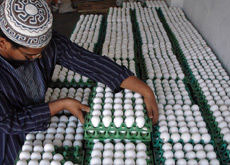
The Economist | Sep 8th 2009
From the Economist Intelligence Unit ViewsWire
Qatar claims to have a new approach in its quest for food security
The Qatar Investment Authority (QIA) has launched a venture aiming to invest in food production worldwide. The Qatari initiative claims to be distinct from similar moves by other Gulf Arab states in that it is focused on the acquisition and development of existing agribusiness companies rather than involving the lease of large tracts of farmland. These large-scale land-lease deals have attracted criticism on the grounds that they could impair the rights of existing smallholders and damage the host country's own food security.
Hassad Food, established by the QIA last year, has recently announced plans to invest US$500m in buying stakes in agricultural companies around the world as part of the government's strategy to secure adequate supply of food at reasonable prices. Qatar, like most of its Gulf Arab peers, depends heavily on imported food, buying some 95% of its requirements from abroad. Hassad's chairman, Nasser Mohamed al-Hajri, said that the company was in talks with half a dozen agricultural firms, including ones in Argentina and Brazil, which are willing to offer the Qatari firm a stake in their businesses.
The surge in world food prices in 2007 and 2008 and the introduction of export restrictions by some countries on certain commodities impelled Gulf countries to develop new strategies for ensuring food security. Companies from Saudi Arabia and the UAE, for example, have leased farmland in Sudan and Pakistan, among other countries, to produce food. However, Hassad does not view direct leasing of land as the best strategy: Mr Hajri explained that leasing deals are not always "win-win situations, and we don't want to be in a situation where the rich are taking away food and land of the poor".
Hassad's focus is instead on investing in existing agricultural businesses and exporting the produce to Qatar where needed. In the process, the company aims to create an additional source of profit, besides ensuring food security for the Qatari population. Mr Hajri said that the current economic crisis had created a lot of opportunities to invest in financially distressed companies. Hassad plans to develop its business in three stages. Initially it is focusing on companies that produce basic food items, like meat, wheat, rice, sugar, soya and animal feeds. In the second stage, it will extend its operations to fruits and vegetable farming, and in the third, it will start marketing and packaging produce under its own brand. Hassad also plans to invest heavily inside Qatar in developing poultry farms and setting up greenhouses to grow vegetables.
Poor farmers
Starved of proper investment, agriculture throughout the Middle East has developed little and remains generally small-scale and inefficient. Attempts at large projects have more often than not resulted in a huge wastage of resources. Libya’s Great Man-made River project, designed to irrigate huge swathes of arable land to enable the country to become self-sufficient in food, has, arguably, become a monumental white elephant, while Saudi Arabia, after having poured billions into the cultivation of wheat has finally given up on the idea, realising that it was far too expensive and, more importantly, used up far too much water, for cultivation to continue. The returns on Egypt's Toshka development in the desert to the west of the Aswan High Dam have thus far been paltry compared with the huge sums invested.
The poor record of agricultural investment within the Middle East begs the question of how effective the investors from the region will be in their farming ventures elsewhere in the world. As yet there are few concrete examples on which to base a judgment. It is not even clear how many of the mega-land-lease deals that have been reported, involving Gulf countries in Asia, Africa and eastern Europe, have actually been concluded as firm contracts. Many of these deals are in fact options, with the onus on the investors to present firm development plans and to deposit downpayments before they actually secure title to the land.
In light of the doubts about the feasibility of the land-lease approach, the course chosen by Qatar's Hassad would appear to have much to recommend it.










